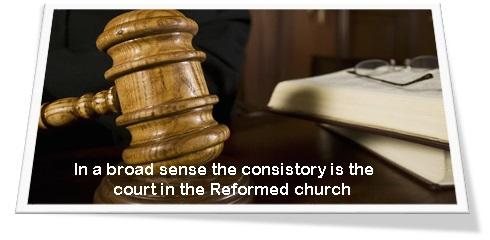The Name and Nature of Family Visitation
The Name and Nature of Family Visitation
The shepherd has but imperfectly done his work when he has procured for, and administered to his flock, wholesome nourishment. He must watch over them, he must not allow either wolves or goats to mix with them, and, should such find their way among them, he must use appropriate means to get rid of them; he must endeavour to prevent the sheep from straying, and, when they do wander, he must employ every proper method to bring them back; he must endeavour to preserve them from the attacks of disease, and administer suitable preventives and medicines for prevailing maladies, and even at personal hazard he must protect them from those beasts of prey who go about seeking to devour them.
John Brown, Expository Discourses on First Peter

One of the most instructive and comforting doctrines of Holy Scripture for the people of God is undoubtedly that of the indivisible spiritual union of Christ and His church. We can no more think of Christ without the church, than we can conceive of the church without Christ.
Especially among Reformed Christians has the conviction of the Lordship of Christ over His spiritual body been influential in molding the government of the organized congregation and the spiritual life of its members. From earliest times, therefore, in our churches it was solemnly confessed that everyone who believed was under obligation not only to unite himself with the church but also to place himself and his family under the spiritual care of the under-shepherds who were appointed by the Exalted Saviour. For although Christ Himself has ascended to heaven to occupy the place of highest glory and exercise world-wide dominion as a reward upon His obedience to the will of the Father, He in His infinite wisdom and love was pleased for the sake of the good order of His church and the welfare of those for whom He gave His life to institute and maintain to this very day the holy offices.
One of these offices, that of the eldership, is particularly concerned with the government of the church. Those to whom this work has been entrusted may find the New Testament replete with counsel and admonition relevant to the faithful discharge of their task. Thus Paul charged the elders at Miletus at the time of his fond farewell,
Take heed unto yourselves, and to all the flock, in which the Holy Spirit hath made you bishops, to feed the church of the Lord which he purchased with his own blood.1
In much the same vein Peter counsels the elders in the churches to which he wrote,
Tend the flock of God which is among you, exercising the oversight, not of constraint, but willingly, according to the will of God; nor yet for filthy lucre, but of a ready mind; neither as lording it over the charge allotted to you, but making yourselves ensamples to the flock.2
It is to the glory of the Reformed churches that they alone throughout the centuries have consistently maintained this office. Whereas in so many churches only ministers of the Word and deacons function as the spiritual leaders of the people, the progeny of the Calvinistic Reformation in imitation of their greatest teacher and leader have insisted on the three offices, each representing in its unique way some aspect of the threefold office of the Saviour.

The duty of these elders is to maintain good order and discipline in the church of Christ.
The sphere of their labours embraces the whole visible church of Jesus Christ, old and young alike.
And because the Reformed churches have always had a deep appreciation for the way in which Christ through His Holy Spirit employs the organic relations of human life for the coming of His kingdom, they have from the very beginning of their history conducted family visitation. By this means the churches have been able to wield an influence in the lives of their members as well as in the life of community and nation far in excess of their numerical strength.
As we begin our study of this important aspect of the work of the organized church, we should first carefully consider the name by which it is designated and also understand clearly what is meant by the practice itself.
The Problem of the Name⤒🔗
Those who are at all acquainted with life in the Reformed churches will at one time or another have come across the Holland term "huisbezoek." This term, and its English equivalents "home-visitation" or "house-visitation," were lucid enough to win rather general acceptance. They immediately bring to our attention the fact that the church is deeply interested in the lives which her members live from day to day, particularly in the sanctuary of their homes. Not only are living members to make diligent use of the means of grace at the time of public worship, but the church through her officers must maintain a direct and close contact with those whose spiritual care has been entrusted to her by the Lord of the church Himself.
In an attempt to find an appropriate English equivalent for the customary Holland designation, our fathers encountered several difficulties. Language is living; has a flavour of its own. It is therefore always hazardous to satisfy oneself with a literal translation of any term. Thus speaking of "home-visitation" or "house-visitation" met with objections.
Many feel, and rightly so, that the church through her officers is not so much interested in the house as a place of habitation as in the family which has taken up residence in some particular place. It is of the very essence of the Reformed religion to stress not the individual as an isolated person but rather the individual in his organic relation to human society. Since the home is the foundation upon which the whole structure of society is built, the proper spiritual contact between the church and her members should be made first of all in the homes. Without ignoring or much less denying the fact that certain problems and difficulties in the lives of individual members will arise which cannot be discussed properly in the presence of others, the Reformed churches have maintained their conviction that under normal circumstances the contact should be sought in and through the family circle. The family consists of those persons who form a household under one head, generally the father. It consists of parents, children, servants (if any), and even such others who may live for a time with these as boarders or friends.
The Term "Visitation"←⤒🔗
By some, great objections have been levelled against the second part of the term. They have even preferred using the word "visiting" to the term "visitation," demurring that the latter refers to an unpleasant or calamitous experience resulting from the wrath of God.
A careful consideration of that word, however, ought to dispel such a notion at once. The New Century Dictionary lists five distinct uses of the term:
- the art of visiting; a visit; esp. visiting or a visit for the purpose of making an official inspection or examination.
- the visit of the Virgin Mary to her cousin Elizabeth; a church festival held on July 2 in commemoration of this visit.
- a visiting with comfort or aid, or with affliction or punishment, as by God.
- a special dispensation from heaven, whether of favour or of affliction.
- any experience or event, especially an unpleasant one, regarded as occurring by divine dispensation; an affliction or punishment from God; a judgment.

From this list it is apparent that no one need object to the term "visitation" at all. The very first meaning given suits our purpose admirably, when casting about for a suitable phrase to describe the work in question. For after all, this work is part of the official program of any well-regulated Reformed church. Every minister and elder installed in the churches assumes part of the responsibility which rests upon the consistory to contact the families entrusted to it, in an official way. Such a call is definitely official, and thus does not depend upon the whims or wishes of either consistory or congregation. And its aim is to make an official inspection or investigation of the lives of the members with a view to ascertaining whether or not they are aware of their spiritual privileges and obligations.
The Name "Consistorial Call"←⤒🔗
Some of those who object to the term discussed above have preferred to speak of the "consistorial call." Such a designation has some decided advantages. It tells us at once who is charged with the responsibility of carrying on this important work. The consistory is constituted of ruling elders. It should be noted that this body always includes the minister of the Word, since he functions in a double capacity, serving the congregation both as ruling and as teaching elder. He must, therefore, give himself not only to teaching and preaching but also to shepherding and governing the people of God.
In a broad sense the consistory is the court in the Reformed church. Here the rules which must govern the members of the congregation are made and tested, applied and upheld. Thus such a consistorial call is the official visit of the members of the church by an appointed committee of the consistory under whose spiritual jurisdiction they have placed themselves. Thus strictly speaking, the elders can carry out this work only with reference to those who are directly under their official supervision, that is, the members of the church by baptism and profession of faith. Others may be counselled by them, since the church must witness to all men, but the officers of the church have no direct spiritual authority over them.
Many arguments can be adduced in favour of this last designation. However, there are also restrictions on the name. Since calls are made by committees of the consistory for other reasons and with other purposes in mind, it may easily lead to confusion. The term "family visitation" undoubtedly deserves preference, since it emphasizes the official nature of the work, speaks of the Christian family as the object of the work, and as a general designation has been widely used and generally accepted in our churches.
Understanding the Nature of the Work←⤒🔗
Although the phrase "family visitation" already describes in a general way the work of the consistory which we are discussing, it is necessary to consider this somewhat more at length.
During the course of the years we have been inclined, particularly in a democratic environment, to minimize the place and necessity of spiritual authority in the church of Christ. As a result too many people cherish erroneous conceptions concerning the right of private judgment in matters of faith and life.
In order that good order may be promoted in the church and that the kingdom of God may be established in the hearts and lives of men, Christ has been pleased to entrust the power of the keys of the kingdom to the officers of the church. By their use those who hear the Word of God may judge whether or not they have a part in the living church.

Our Belgic Confession, although using slightly different terminology makes mention of these keys in Article 29, when it speaks of "The marks of the true church, and wherein it differs from the false church."
The marks by which the true church is known are these: If the pure doctrine of the gospel is preached therein; if it maintains the pure administration of the sacraments as instituted by Christ; if church discipline is exercised in the punishing of sin; in short, if all things are managed according to the pure Word of God, all things contrary thereto rejected, and Jesus Christ acknowledged as the only Head of the Church. Hereby the true Church may certainly be known, from which no man has a right to separate himself.
The next three articles elaborate on this subject in such a way that anyone who reads them must conclude that the Reformed churches early placed a high value on the rules of discipline according to which they were to order their lives.
In the Heidelberg Catechism an even more elaborate description is given of these keys, which are there considered to be the preaching of the holy gospel and church discipline or excommunication out of the Christian church. To this definition is added the explanation of their use, "By these two the kingdom of heaven is opened to believers and shut against unbelievers." From such definitions it is evident that our Reformed fathers believed that the officers of the church were entrusted with a large measure of spiritual responsibility and clothed with great spiritual authority.
In the Roman Catholic church the idea of the keys of the kingdom had always enjoyed a prominent place. It confessed that the visible church through the hierarchy could open or shut heaven to the individual. In fact, the whole papal system of church government rests upon that assumption.
However, through the centuries the use of the keys of the kingdom in the Roman church had shifted from the preaching of the gospel to the confessional. It was there and there alone that supervision was exercised over the faith and conduct of the believer. Upon such stated occasions the priest, who was clothed with all authority by virtue of his consecration at the hands of a bishop, could interrogate the members, evaluate their spiritual condition and impose the required penalties upon all who erred.
The Reformed churches at the very beginning of their independent existence again restored the preaching of the gospel to its rightful place. However, they claimed that since the church can never know the individual heart except in so far as the individual speaks freely and honestly, the judgment of the church is necessarily conditional. In the last analysis the individual believer must judge whether or not he is right with God and thus meets the conditions which the Word of God demands of all those who claim to be in the faith. But in order that the individual who heard the gospel might be able to examine his heart and life properly in the light of the Word, the Reformed churches early instituted the practice of family visitation.
Making Necessary Distinctions←⤒🔗
From this it is evident that family visitation is a unique type of pastoral work carried on by the church of Christ.
It may never degenerate in the direction of becoming a purely social visit for the purpose of paying respects to those who hold membership in the visible church. This seems to be the emphasis in many of the denominations around us. Too often statements are made in which the zeal of a pastor for making such social calls regularly is lauded as the cause of his success in the ministry.
Should family visitation gradually begin to assume this character, we may be sure that the officers have long forgotten their duty laid upon them by the Saviour Himself as well as the authority with which He has clothed them for the faithful discharge of the same. History demonstrates that where social demands overshadow the spiritual in the church, spiritual life suffers lamentably and the church of Christ languishes.
We ought to make a careful distinction between family visitation and mutual edification.

The latter ought very definitely assume a large place in our Christian life. It is impossible for the believer who is conscious of the great gift of salvation which he enjoys to refrain from speaking about this to others. The duty of testifying to and confessing Christ before men belongs to the office of all believers. Often the Scriptures speaks of the necessity of "exhorting one another" to faith and good works.
However, family visitation differs radically from this aspect of the life of the living church. It is conducted officially. Although we ought to admonish one another often in the spirit and after the example of Christ, it has not pleased the Head of the church to grant spiritual authority to all. This He has reserved only for the officers. Indeed, as men and brethren of the congregation they are no more important and necessary than any of the other members.
Yet by virtue of their holy calling they occupy a unique place and are called to a unique work. They are to tend the flock of God, and in order that they may be able to discharge their duty to the glory of God and the welfare of the church, they have received spiritual authority.
In our days of revolution it is not amiss to emphasize often the place and purpose of such spiritual authority in the congregation.
A well-regulated Reformed church cannot exist without a knowledge of and acquiescence to the spiritual powers which Christ has conferred upon her elders. When then, they conduct family visitation, they enter the home not merely as fellow-brethren in the faith for the purpose of giving good counsel and bringing consolation. Rather, they are sent out by Christ as the Great Shepherd of His sheep to bring the members of His flock an official message in His behalf.
Such work places a heavy responsibility upon those who are called to perform this task.
All matters with which they must deal are strictly confidential. Theirs is never the duty of prying into the secrets of the heart. Yet they must be able to form some adequate conception of the level of spirituality found among the members of the church. In the true sense of the word their work is that of "shepherding the flock." They must lead and guide, instruct and exhort, warn and comfort all those whom God in His providence has entrusted to their spiritual care.

Add new comment